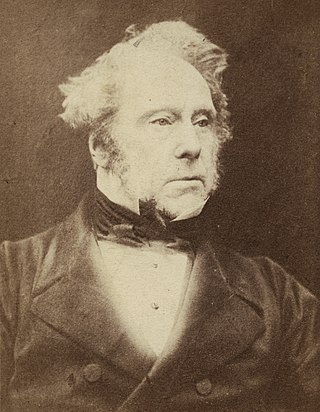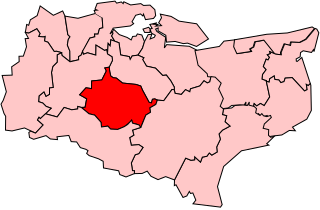
The Parliament of the United Kingdom of Great Britain and Northern Ireland is the supreme legislative body of the United Kingdom, and may also legislate for the Crown Dependencies and the British Overseas Territories. It meets at the Palace of Westminster in London. Parliament possesses legislative supremacy and thereby holds ultimate power over all other political bodies in the United Kingdom and the Overseas Territories. While Parliament is bicameral, it has three parts: the sovereign (King-in-Parliament), the House of Lords, and the House of Commons. In theory, power is officially vested in the King-in-Parliament. However, the Crown normally acts on the advice of the prime minister, and the powers of the House of Lords are limited to only delaying legislation; thus power is de facto vested in the House of Commons.

The Supreme Court of Judicature Act 1873 was an Act of the Parliament of the United Kingdom in 1873. It reorganised the English court system to establish the High Court and the Court of Appeal, and also originally provided for the abolition of the judicial functions of the House of Lords with respect to England. It would have retained those functions in relation to Scotland and Ireland for the time being. However, the Gladstone Liberal government fell in 1874 before the Act entered into force, and the succeeding Disraeli Conservative government suspended the entry into force of the Act by means of the Supreme Court of Judicature (Commencement) Act 1874 and the Supreme Court of Judicature Act 1875.

The Representation of the People Act 1832 was an Act of Parliament of the United Kingdom that introduced major changes to the electoral system of England and Wales. It reapportioned constituencies to address the unequal distribution of seats and expanded franchise by broadening and standardising the property qualifications to vote. Only qualifying men were able to vote; the Act introduced the first explicit statutory bar to women voting by defining a voter as a male person.

The 1865 United Kingdom general election saw the Liberals, led by Lord Palmerston, increase their large majority over the Earl of Derby's Conservatives to 80. The Whig Party changed its name to the Liberal Party between the previous election and this one.

The Representation of the People Act 1867, known as the Reform Act 1867 or the Second Reform Act, is an act of the British Parliament that enfranchised part of the urban male working class in England and Wales for the first time. It took effect in stages over the next two years, culminating in full commencement on 1 January 1869.

Great Yarmouth is a constituency represented in the House of Commons of the Parliament of the United Kingdom since the 2010 general election by Sir Brandon Lewis, a Conservative.

Gloucester is a constituency centred on the cathedral city and county town of the same name, represented in the House of Commons of the UK Parliament by Richard Graham of the Conservative Party.

The Corrupt and Illegal Practices Prevention Act 1883 or the Corrupt Practices Act 1883 was an Act of the Parliament of the United Kingdom of Great Britain and Ireland. It was a continuation of policy to make voters free from the intimidation of landowners and politicians. It criminalised attempts to bribe voters and standardised the amount that could be spent on election expenses.

The Redistribution of Seats Act 1885 was an Act of the Parliament of the United Kingdom. It was a piece of electoral reform legislation that redistributed the seats in the House of Commons, introducing the concept of equally populated constituencies, a concept in the broader global context termed equal apportionment, in an attempt to equalise representation across the UK. It was associated with, but not part of, the Representation of the People Act 1884.

Maidstone was a parliamentary constituency represented in the Parliament of England, Great Britain and from 1801 the House of Commons of the Parliament of the United Kingdom.
William Forbes Mackenzie was a Scottish Conservative politician and temperance reformer. He is best known for the Forbes MacKenzie Act, legislation passed in 1853 to regulate public houses in Scotland.
Sligo Borough is a former borough constituency in Ireland, represented in the House of Commons of the Parliament of the United Kingdom.

Corrupt practices in English election law includes bribery, treating, undue influence, personation, and aiding, abetting, counselling and procuring personation.

Beverley has been the name of a parliamentary constituency in the East Riding of Yorkshire for three periods. From medieval times until 1869 it was a parliamentary borough consisting of a limited electorate of property owners of its early designated borders within the market town of Beverley, which returned (elected) two Members of Parliament to the House of Commons of the English and Welsh-turned-UK Parliament during that period.
Northumberland, was a County constituency of the House of Commons of the Parliament of England from 1290 to 1707, then of the Parliament of Great Britain from 1707 to 1800 and of the Parliament of the United Kingdom from 1801 to 1832. It was represented by two Members of Parliament.
East Retford was a parliamentary constituency in Nottinghamshire, which elected two Members of Parliament (MPs) to the House of Commons for the first time in 1316, and continuously from 1571 until 1885, when the constituency was abolished. Although East Retford was technically a parliamentary borough for the whole of its existence, in 1830 its franchise had been widened and its boundaries had been extended to include the whole Wapentake of Bassetlaw as a remedy for corruption among the voters, and from that point onward it resembled a county constituency in most respects.
Hindon was a parliamentary borough consisting of the village of Hindon in Wiltshire, which elected two Members of Parliament (MPs) to the House of Commons from 1448 until 1832, when the borough was abolished by the Great Reform Act. It was one of the most notoriously corrupt of the rotten boroughs, and bills to disfranchise Hindon were debated in Parliament on two occasions before its eventual abolition.
Shaftesbury was a parliamentary constituency in Dorset. It returned two Members of Parliament to the House of Commons of England, Great Britain and the House of Commons of the Parliament of the United Kingdom from 1295 until 1832 and one member until the constituency was abolished in 1885.

Morgan v Simpson [1975] QB 151 is a UK constitutional law case, concerning the right to vote and the integrity of votes and elections in the United Kingdom.











